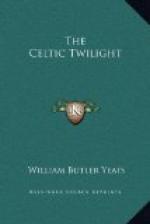Those who are much admired are, it is held, taken by the Sidhe, who can use ungoverned feeling for their own ends, so that a father, as an old herb doctor told me once, may give his child into their hands, or a husband his wife. The admired and desired are only safe if one says “God bless them” when one’s eyes are upon them. The old woman that sang the song thinks, too, that Mary Hynes was “taken,” as the phrase is, “for they have taken many that are not handsome, and why would they not take her? And people came from all parts to look at her, and maybe there were some that did not say ‘God bless her.’” An old man who lives by the sea at Duras has as little doubt that she was taken, “for there are some living yet can remember her coming to the pattern[FN#3] there beyond, and she was said to be the handsomest girl in Ireland.” She died young because the gods loved her, for the Sidhe are the gods, and it may be that the old saying, which we forget to understand literally, meant her manner of death in old times. These poor countrymen and countrywomen in their beliefs, and in their emotions, are many years nearer to that old Greek world, that set beauty beside the fountain of things, than are our men of learning. She “had seen too much of the world”; but these old men and women, when they tell of her, blame another and not her, and though they can be hard, they grow gentle as the old men of Troy grew gentle when Helen passed by on the walls.
[FN#3] A “pattern,” or “patron,” is a festival in honour of a saint.
The poet who helped her to so much fame has himself a great fame throughout the west of Ireland. Some think that Raftery was half blind, and say, “I saw Raftery, a dark man, but he had sight enough to see her,” or the like, but some think he was wholly blind, as he may have been at the end of his life. Fable makes all things perfect in their kind, and her blind people must never look on the world and the sun. I asked a man I met one day, when I was looking for a pool na mna Sidhe where women of faery have been seen, bow Raftery could have admired Mary Hynes so much f he had been altogether blind? He said, “I think Raftery was altogether blind, but those that are blind have a way of seeing things, and have the power to know more, and to feel more, and to do more, and to guess more than those that have their sight, and a certain wit and a certain wisdom is given to them.” Everybody, indeed, will tell you that he was very wise, for was he not only blind but a poet? The weaver whose words about Mary Hynes I have already given, says, “His poetry was the gift of the Almighty, for there are three things that are the gift of the Almighty—poetry and dancing and principles. That is why in the old times an ignorant man coming down from the hillside would be better behaved and have better learning than a man with education you’d meet now, for they got it from God”; and a man at Coole says, “When he put his finger to one part of his head, everything




